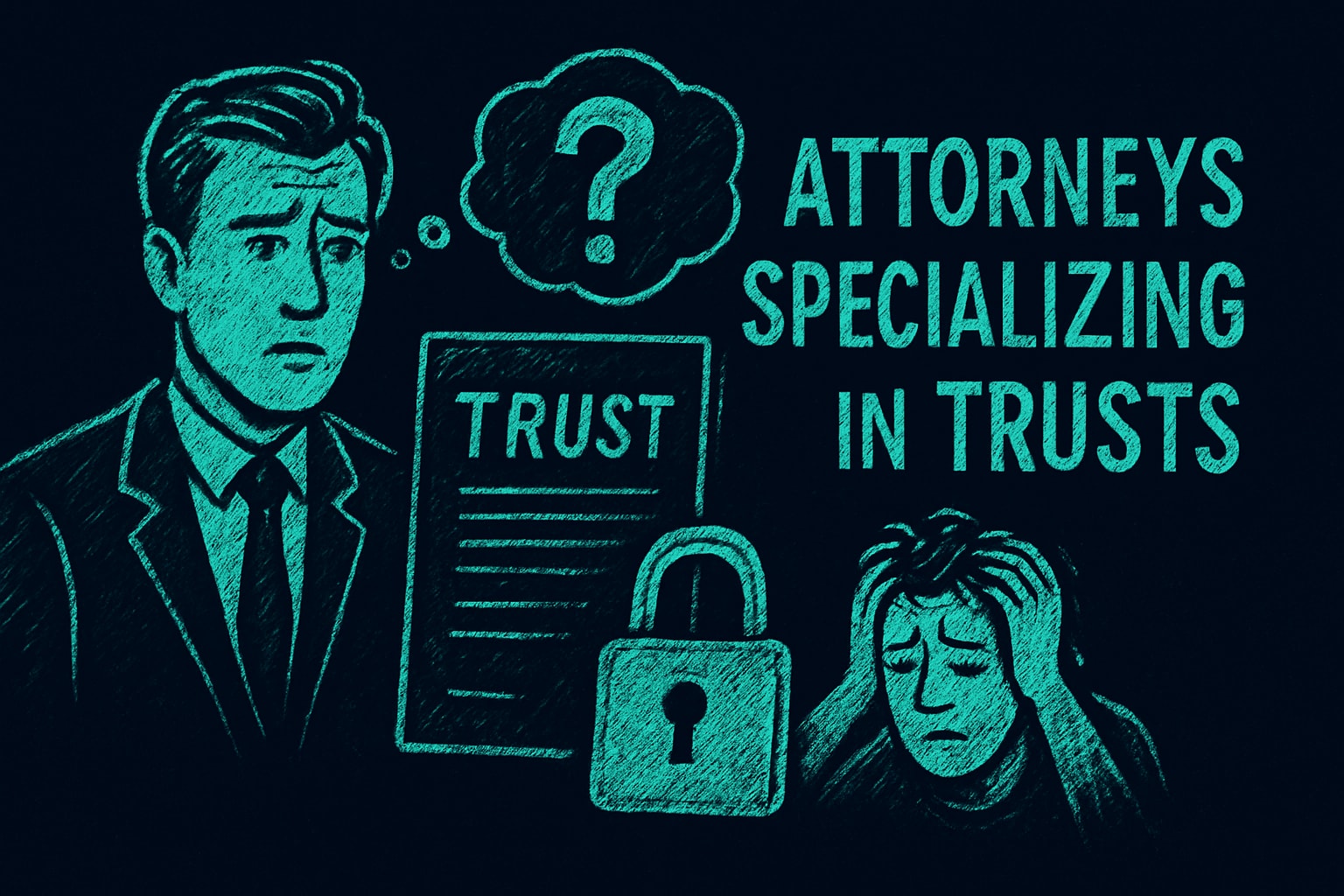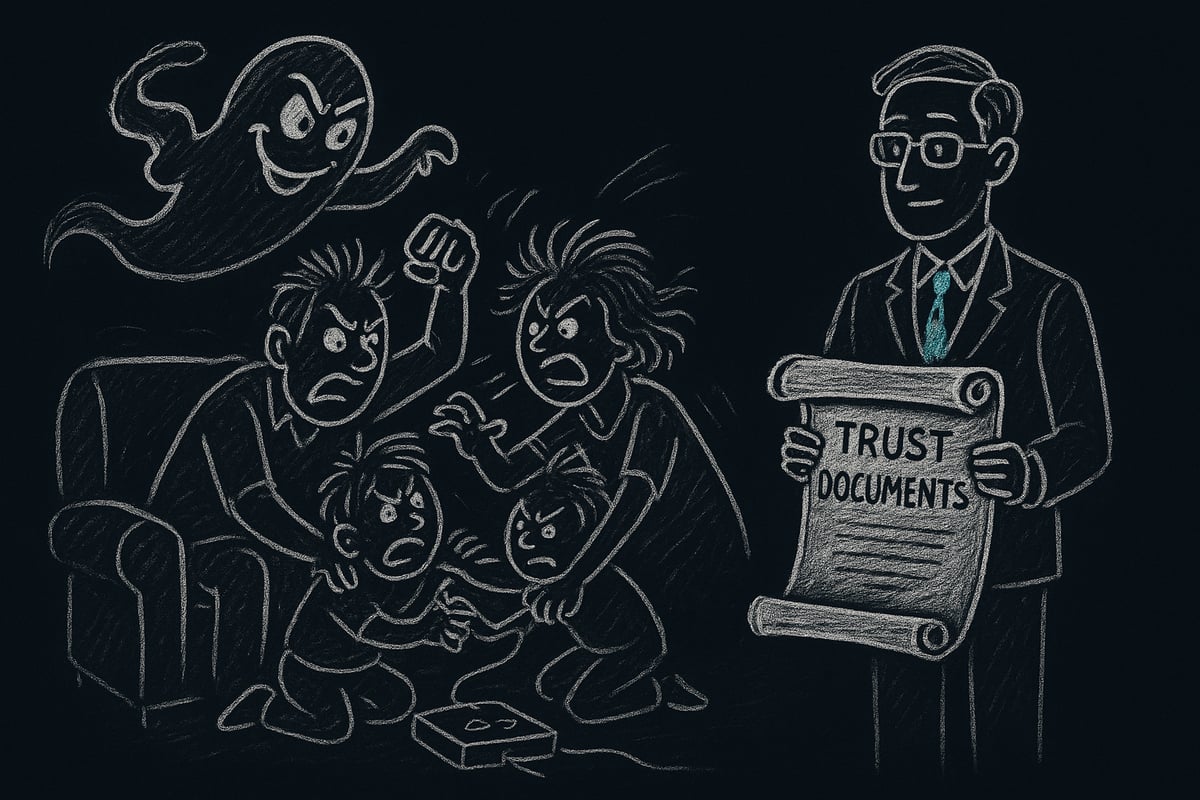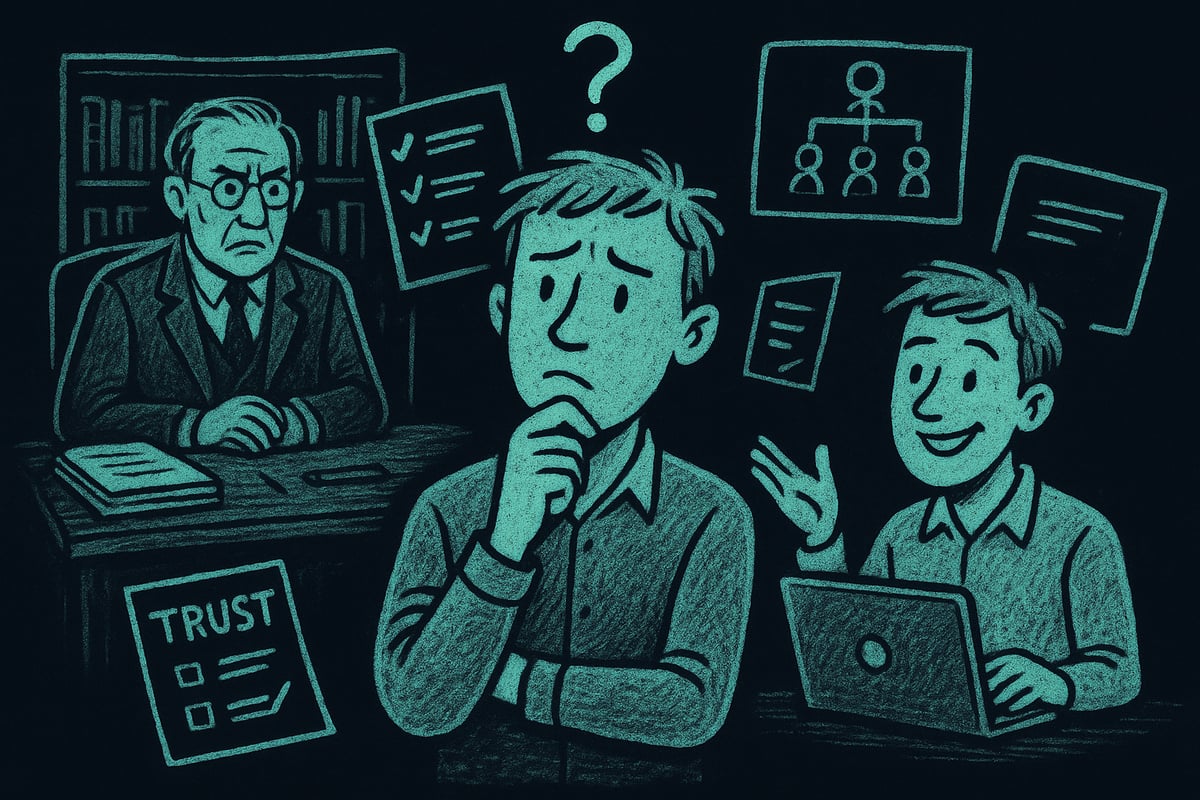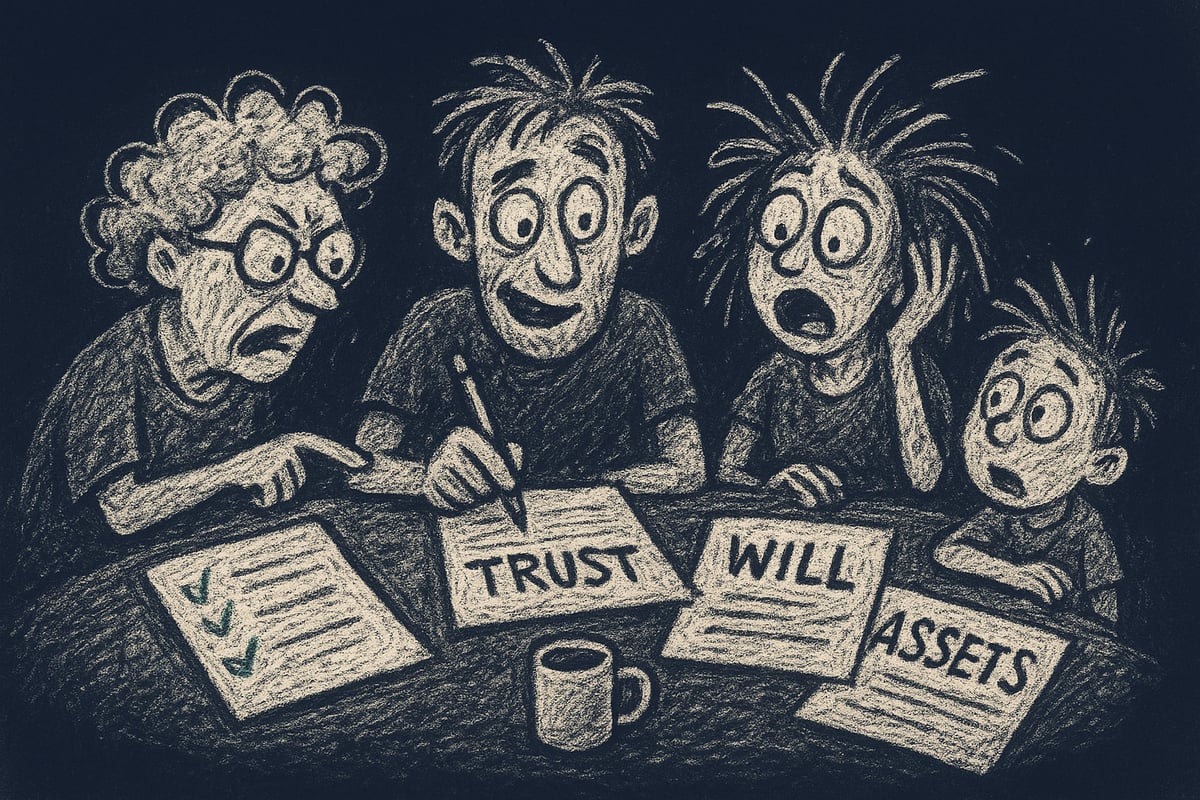Attorneys Specializing in Trusts: The Essential Guide 2025

Let’s be real, figuring out what happens to your stuff after you die is about as fun as dental surgery. But if you think attorneys specializing in trusts are just for the ultra-rich or paranoid, think again. The truth is, estate planning is a minefield of stress, confusion, and family drama waiting to happen—unless you get the right professional help.
This unapologetically honest guide rips the mask off the mystery. You’ll finally understand what these attorneys actually do, why you might desperately need one, the dizzying types of trusts out there, how to sniff out a true specialist, and what’s changing in trust law for 2025.
If you’re tired of putting off the inevitable and want your legacy secured (or at least want to make sure your ex doesn’t get your PlayStation), keep reading. You might even end up feeling slightly less irresponsible.
What Does an Attorney Specializing in Trusts Do?
If you think attorneys specializing in trusts just sit around drawing up dusty documents, think again. Their job is equal parts legal wizardry, family therapist, and tax ninja. Picture them as the bouncers at the velvet rope of your estate, keeping freeloaders and lawsuits out, letting only your chosen heirs onto the dance floor.

Core Responsibilities and Services
Attorneys specializing in trusts handle much more than paperwork. Here’s what they actually do for you:
- Draft and review all types of trusts: revocable, irrevocable, special needs, charitable, and more.
- Update existing trusts as your life (and your exes) change.
- Advise on minimizing estate taxes so the IRS doesn’t get an invite to your death party.
- Protect your assets from creditors, lawsuits, and even greedy relatives.
- Navigate tricky family or business dynamics, customizing trusts for blended families, estranged siblings, or awkward in-laws.
- Administer trusts after you’re gone, making sure assets are distributed according to your wishes and not whoever shouts the loudest.
- Ensure your documents are airtight and comply with all the latest federal and state regulations.
- Step in to represent you if a trust dispute turns into a legal brawl.
- Provide ongoing advice as your financial and family circumstances evolve.
For example, attorneys specializing in trusts can help a blended family sidestep probate drama by tailoring a trust that spells out exactly who gets what (and who gets nothing). They don’t just write documents—they keep your legacy from turning into a reality TV episode.
The Value of Specialized Legal Expertise
Why not just DIY your trust with a $49 template? Because trust law is a moving target, and attorneys specializing in trusts are the only ones keeping up with the constant rule changes. The right specialist can sniff out sneaky tax-saving opportunities and spot landmines that would blow up your estate plan.
According to the Estate Planning Statistics & Facts to Know in 2025, a whopping 68% of estate plans are more effective with the guidance of attorneys specializing in trusts compared to doing it solo. Non-specialists often create invalid documents or miss out on advanced tax strategies, leaving your heirs with more headaches than inheritance.
Let’s put it bluntly: Would you trust your family’s future to someone who last read a trust law update in 1998? Attorneys specializing in trusts stay sharp, ensuring your plan works exactly as intended—no loopholes, no drama, no court-ordered surprises.
Types of Trusts and When You Need a Trust Attorney
You know what’s more terrifying than death? Your family fighting over your stuff while you haunt them from the afterlife. That’s where attorneys specializing in trusts come in, making sure your legacy is more “cheers to your memory” and less “Hunger Games: Probate Edition.” Let’s break down the types of trusts you can actually use, not just nod at like you understand them.

Overview of Common Trust Structures
First up, the “choose your own adventure” of estate planning. Trusts aren’t just for the mega-rich or that one uncle who collects gold bars. There are several flavors, each designed for different flavors of dysfunction and financial goals:
- Revocable Living Trusts: Like a Netflix subscription for your assets. Change, update, or cancel anytime while you’re alive. Great for control freaks.
- Irrevocable Trusts: Once signed, it’s locked tighter than your ex’s social media. Offers tax perks and asset protection, but you can’t just take it back.
- Special Needs Trusts: Protects benefits for loved ones with disabilities, so the government doesn’t swoop in and snatch everything.
- Charitable Trusts: Want to leave a legacy (and maybe stick it to your heirs)? This lets you donate to charity, with sweet tax incentives.
- Testamentary Trusts: Created by your will, kicks in when you kick the bucket. Perfect for controlling from beyond the grave.
- Spendthrift Trusts: For that one relative who thinks “budget” is a dirty word. Shields assets from their creditors and bad decisions.
According to the 2025 Estate Planning Report by Trust & Will, more Americans are using trusts than ever. Why? Because trusts let you skip probate court, minimize taxes, and avoid family drama. It’s basically adulting at its finest.
Attorneys specializing in trusts help you pick the right structure, making sure your assets aren’t left to chance or, worse, your least favorite cousin.
Situations Requiring a Trust Attorney
So, when do you actually need attorneys specializing in trusts? If you think just writing “give everything to my dog” on a napkin counts, think again. Here are the real triggers:
- Blended or complicated families: Stepchildren, exes, estranged siblings—trusts let you spell out who gets what, so nobody has to duel at dawn.
- High net worth: If you have a vacation home, business, or just a suspiciously large collection of crypto, trusts are essential for tax planning and asset protection.
- Business owners: Want your company to survive you? Attorneys specializing in trusts can structure business succession so it doesn’t implode.
- Minor children or special needs dependents: Trusts ensure they’re cared for, without the state making wild guesses.
- Multi-state assets: Own property in more than one state? Trusts help you dodge the nightmare of multiple probates.
Imagine this: A business owner wants to retire without their kids turning the family shop into a TikTok dance studio. By working with attorneys specializing in trusts, they create a succession plan that keeps the business in the right hands, avoids probate, and even saves on taxes.
Bottom line? If your life is even slightly more complicated than a sitcom plot, attorneys specializing in trusts give you peace of mind, not just paperwork.
How to Choose the Right Attorney Specializing in Trusts
So, you have finally accepted your fate: you are going to die, and you do not want your family to turn Thanksgiving into a battle royale over your leftovers. Picking the right attorney is like picking a surgeon for your wallet. Let’s make sure you do not choose the legal equivalent of Dr. Nick from The Simpsons.

Credentials and Experience
Not all attorneys specializing in trusts are created equal. Some are seasoned pros, others should not be trusted with your goldfish’s will. When evaluating candidates, check for:
| Credential | What It Means | Why It Matters |
|---|---|---|
| Board Certification | Advanced expertise in estate or trust law | Proof of specialization |
| Years of Experience | Number of trusts handled | Real-world know-how |
| Professional Memberships (ACTEC, etc) | Ongoing legal education and networking | Up-to-date on laws |
If your attorney cannot show a track record with trusts more complicated than a piggy bank, keep looking. Only attorneys specializing in trusts will spot the legal landmines that could leave your loved ones in a mess.
Questions to Ask During Consultation
Shopping for attorneys specializing in trusts should feel less like speed dating and more like grilling a babysitter for your life savings. Ask:
- What is your process for creating or updating a trust?
- How do you keep up with state and federal trust laws?
- Can you provide references or case studies?
- What are your fees and billing structures?
If the answers sound like legal Mad Libs, run. Attorneys specializing in trusts should be able to explain things in plain English, not legalese designed to make you nod and sign your house away.
Red Flags and Common Pitfalls
Watch out for these warning signs when vetting attorneys specializing in trusts:
- They push complicated trusts you do not need (congrats, you’re now the proud owner of a trust for your pet rock).
- Pricing is cloudier than your last existential crisis.
- Communication feels like you are ghosted by a bad Tinder date.
- Documents are unclear or riddled with errors.
A good attorney will not pressure you into unnecessary complexity or make you feel like you just joined a secret society you cannot escape.
Finding Local and Virtual Specialists
You can find attorneys specializing in trusts the old-fashioned way through state bar directories, or you can embrace technology and compare virtual options. Virtual attorneys might save you money and time, but do not sacrifice responsiveness or expertise.
When weighing your options, consider recent trends in estate planning. According to Vanilla’s 2025 State of Estate Planning Report, more people are prioritizing trust attorneys who blend tech-savvy solutions with human expertise. It is like choosing between a robot and a wisecracking lawyer who actually calls you back.
Whichever route you choose, demand clear answers and fair fees. Because death is free, but sorting your assets with the wrong attorney could cost your heirs their sanity.
The Trust Creation Process: Step-by-Step Guide
So, you have finally accepted your own mortality. Congrats! You’re already ahead of 64% of Americans still pretending they’ll live forever. Let’s break down the trust creation process, so you can stop worrying about your family turning Thanksgiving into a courtroom drama.

Step 1: Initial Consultation and Needs Assessment
First, you meet with attorneys specializing in trusts. This is where you spill your secrets—your assets, your weird family dynamics, and your goals. The attorney asks questions you never thought you’d answer outside a therapist’s office.
- Inventory your assets
- Identify beneficiaries (even the ones you don’t like)
- Set goals for asset protection and legacy
This stage is more important than that yearly physical you keep skipping.
Step 2: Selecting the Appropriate Trust Structure
Now, your attorney matches your needs to the right trust type. Do you want flexibility? Control from the grave? Protection from creditors or ex-spouses? Attorneys specializing in trusts will explain the pros and cons, keeping you from accidentally giving your entire estate to your cat.
- Revocable vs. irrevocable
- Special needs, charitable, or spendthrift trusts
- Customized solutions for blended families
Choose wisely—this isn’t a BuzzFeed quiz.
Step 3: Drafting Trust Documents
Here’s where attorneys specializing in trusts start earning their keep. They draft documents in plain English (sometimes) and legalese (always). Every clause is tailored to your assets and wishes.
- Legal validity is key
- Avoids costly mistakes from DIY templates
- Customizes provisions for family quirks
Trust documents are like tattoos: mistakes are painful and expensive to fix.
Step 4: Funding the Trust
A trust without assets is like a safe with no gold. Attorneys specializing in trusts guide you through transferring real estate, investments, or that vintage comic book collection into your trust.
- Change titles and beneficiary designations
- Coordinate with banks and financial advisors
- Ensure nothing gets left out
If you skip this, your trust is just a fancy stack of paper.
Step 5: Reviewing and Signing
This is the “sign here, here, and here” moment. Your attorney ensures you have the right witnesses and notaries. The process is as exciting as waiting at the DMV, but at least it’s over quickly.
- Comply with state law requirements
- Double-check for errors
- Store documents securely
At this point, everyone breathes a sigh of relief. For now.
Step 6: Ongoing Maintenance and Updates
Life changes. So should your trust. Attorneys specializing in trusts recommend regular reviews—marriages, divorces, new kids, or a surprise lottery win all trigger updates.
- Annual or major life event reviews
- Adjust to new laws or tax rules
- Keep documents current
Neglect this step, and you risk your ex inheriting your PlayStation.
Example Scenario: Creating a Revocable Living Trust for Minor Children
Imagine a family with two minor kids and a not-so-minor mortgage. They meet with attorneys specializing in trusts, choose a revocable living trust, and ensure their assets skip probate. Guardianship is set, college funds are protected, and the family avoids a Game of Thrones-style inheritance battle. For more on why Americans finally get their act together with estate planning, check out Caring.com’s 2025 Wills and Estate Planning Study.
Trusts, Wills, and the Rise of Online Estate Planning Solutions
So, you’re finally thinking about estate planning. Welcome to adulthood. The good news? You have choices. The bad news? If you pick the wrong one, your family could be starring in the next episode of “Probate Court: Family Feud Edition.”
Comparing Trust Attorneys and DIY Online Platforms
Let’s be blunt. Attorneys specializing in trusts are like skilled surgeons for your financial future. They dissect your messy life, stitch up loopholes, and make sure your ex doesn’t walk off with your vintage guitar.
Online DIY platforms? They’re more like YouTube tutorials for open-heart surgery. Sure, they’re cheap and fast, but one wrong click and your “estate plan” is a legal time bomb.
Here’s a quick breakdown:
| Solution | Pros | Cons |
|---|---|---|
| Attorneys specializing in trusts | Customization, legal compliance, expert tax advice | Higher upfront cost, takes more time |
| Online Platforms | Affordable, convenient, instant access | Limited support, risky for complex needs |
If your finances or family look like a soap opera, you need real attorneys specializing in trusts.
The Role of Online Will Creation Services
Online will creation is booming, and why not? According to Caring.com, 34% of Americans used online services for estate planning in 2023. It’s fast, cheap, and surprisingly painless—until it isn’t.
Online platforms shine for simple estates. If your biggest asset is a 2002 Corolla, and your only heir is your cat, these sites are perfect. But attorneys specializing in trusts aren’t just for the super-rich. They’re essential when you have multiple properties, business interests, or relatives who haven’t spoken since the 90s.
Bottom line: Online tools are great for the basics, but don’t expect them to fix family drama or outsmart the IRS.
Example: When an Online Solution Works—and When It Doesn’t
Picture this: You’re single, no kids, and your net worth barely covers your student loans. An online will does the trick. Congrats! You’re slightly less irresponsible than you were ten minutes ago.
But what if you’ve got a blended family, a business, or you’re worried your brother-in-law will contest your trust? This is where attorneys specializing in trusts pay for themselves. They can navigate messes that would make a reality TV producer blush.
If you need a simple will, online estate planning platforms are fine. For anything more complicated, invest in attorneys specializing in trusts. Your heirs will thank you, or at least fight less.
Key Legal and Regulatory Changes in Trusts for 2025
The legal world never sleeps, and the rules around trusts? They’re changing faster than your last relationship status. If you thought you could set and forget your estate plan, think again. Attorneys specializing in trusts are prepping for a year of new hurdles and loopholes—so buckle up.
Federal and State Law Updates
This year, estate tax thresholds are shifting yet again. Some states are raising exemption limits while others are tightening reporting rules. The IRS now wants a closer look at your trust’s digital assets—yes, your crypto and those embarrassing NFTs count.
A quick summary:
| Change Type | 2025 Update |
|---|---|
| Estate Tax Threshold | Increased in some states, decreased in others |
| Trust Reporting | Stricter federal disclosure requirements |
| Digital Assets | New rules on inclusion and valuation |
Attorneys specializing in trusts must track these moving targets to keep your plans compliant. Blink and you’ll miss a new form or deadline.
Impact on Trust Planning Strategies
What does all this mean for you? Spoiler: more paperwork, less sleep, and a greater need for attorneys specializing in trusts. Irrevocable trusts face extra scrutiny, so hiding your Bitcoin under grandma’s mattress just got riskier.
You might need to restructure your trust to dodge unnecessary taxes or update beneficiaries to comply with digital asset laws. The smart move? Regular checkups with your attorney to make sure your estate plan isn’t legally obsolete by next Tuesday.
Expert Insights
Legal pros are already roasting procrastinators: “If you haven’t reviewed your trust in two years, you’re basically donating your wealth to the IRS,” jokes one estate planner. Attorneys specializing in trusts recommend annual reviews, especially for special needs trusts, which are directly affected by new reporting mandates.
For a breakdown of 2025’s top legal changes, check resources like the American Bar Association’s trust law updates. Bottom line: the law is evolving, and your estate plan should too—before your heirs start a family feud worthy of reality TV.
Frequently Asked Questions About Trust Attorneys
Ever wondered if attorneys specializing in trusts are just for rich people with castles and secret family feuds? Spoiler: they’re not. Let’s roast your procrastination and clear up the confusion, one question at a time.
Do I really need a trust if I already have a will?
A will is like a grocery list for your heirs. Attorneys specializing in trusts create documents that actually keep your stuff out of probate court, save taxes, and avoid family brawls over your vinyl collection. Trusts can do what wills simply cannot.
How much do attorneys specializing in trusts charge in 2025?
Expect everything from flat fees (think $2,000–$5,000 for basic trusts) to hourly billing for drama-filled family sagas. You get what you pay for. DIY is cheap, but so is a tattoo from a guy in a van.
Can I update my trust without an attorney?
Technically, yes, if you love paperwork and legal landmines. But keep in mind, attorneys specializing in trusts know the new 2025 laws, so your “update” will not land your heirs in hot water.
What happens if my trust is contested?
Cue the family drama. Contesting a trust means court, legal fees, and the kind of group text chains you never want to read. A specialist can defend your wishes, making your trust as ironclad as possible.
Are trust attorneys just for the wealthy?
Nope. If you have a house, kids, or even a decent savings account, you need one. Attorneys specializing in trusts work with regular folks who want to keep their hard-earned assets from ending up in the wrong hands.
How do I know if my trust is legally valid?
Your trust is valid if it follows your state’s laws, is properly signed, and is funded. To avoid rookie mistakes, check your paperwork against your state bar’s estate planning resources. Not sure? Ask an attorney specializing in trusts to review it.
Real-world scenario:
Imagine your sister contests your trust because she thinks she deserves your dog and your car. Attorneys specializing in trusts can mediate, defend your wishes, and make sure your stuff goes exactly where you intended. Congrats, you’re slightly less irresponsible than you were ten minutes ago.
Look, I get it—trusts, wills, attorneys… it all sounds like a nightmare you can safely ignore until you’re haunting your own attic. But if you’ve made it this far, you’re already ahead of the “I’ll just let my relatives arm-wrestle for my vinyl collection” crowd. Why let a bunch of strangers (or your least favorite cousin) decide who gets what when you can lock it down now? Skip the drama and the overpriced legal maze. Take five minutes to be a responsible adult—your future ghost will thank you. Ready to take the first step? Start My Will Now
Related Articles You Should Read
What Happens If You Die Without a Will in Tennessee: 2026 Complete Guide
What Happens If You Die Without a Will in Tennessee: 2026 Complete Guide Meta Description: Dying without a will in Te...
What Happens If You Die Without a Will in Pennsylvania: 2026 Guide
What Happens If You Die Without a Will in Pennsylvania: 2026 Guide Meta Description: Die without a will in Pennsylvan...
What Happens If You Die Without a Will in New York: 2026 Complete Guide
What Happens If You Die Without a Will in New York: 2026 Complete Guide Meta Description: Die without a will in New Y...